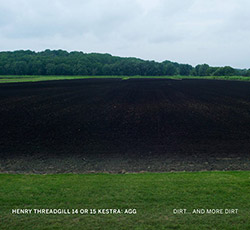
Threadgill, at 74, has had a very long and illustrious career. Had he stopped playing after Air's demise, his legacy would have been assured, but his work with the Sextett in the 80s and Very Very Circus in the 90s only added to his fine corpus.
The disc is divided into two suites, "Dirt" (six episodes) and "And More Dirt" (four), played by an ensemble that varies between fourteen and fifteen and includes instrumentation that Threadgill has adopted for quite a while now, such as tuba, cello and Liberty Ellman's electric guitar. The first section of "Dirt" is a type of composition that Threadgill has long since perfected, a "gathering storm" approach beginning here with bowed bass and percussion, harmonium added in after a couple of minutes, then tuba, guitar, a piano solo and eventually the entire ensemble in an engaging contrapuntal welter. It works fine, even if it's a construct we've often heard before. Following a brief piano duo, the first suite contains four sections, each lasting between about four or five minutes: a light, tuba-anchored lilt featuring one of the altoists, either Roman Fili˙ or Curtis Robert Macdonald and a trombonist (Jacob Garchik or Ben Gerstein), then Threadgill; a similarly jaunty number with two good trumpet solos (Jonathan Finlayson and Stephanie Richards); a softer, more plaintive work featuring spare percussion, including a single, clear bell that morphs into the final section, a semi-funky march. If I have a complaint, it's simply that, as well-performed as they are, the pieces are essentially nothing we haven't encountered in Threadgill's work before. I also miss the caliber of instrumentalists like, say, Fred Hopkins, Steve McCall, Diedre Murray, etc., musicians whose identity stood out clearly. As well, the extreme poignancy that Threadgill has evinced in his writing is somewhat absent (until the final piece, as mentioned below).
"And More Dirt" picks up seamlessly, with an opening section that perhaps recalls Mingus a little bit, with a nice underlying cushion provided by the harmonium that supports piano, guitar, cello and flute solos. Another short piano duo leads to a brief, spiky section, a little reminiscent of Muhal Richard Abrams. Finally, however, the fourth portion of this suite arrives at the kind of gorgeous writing and music I'd been waiting for. Cautious piano introducing Threadgill on alto, playing with the deep emotion, the sadness borne of the weight of history that shoots us back to the great recordings from Air. The ensemble enters with the slow swagger of a New Orleans funeral, Threadgill wailing atop. A great finale; would that there was more like this throughout. There are listeners for whom Threadgill can do no wrong and, I'm sure, they'll be quite pleased with the current effort but I hear, for all its craftsmanship and professionalism, something of water being treaded.
Comments and Feedback:
|



